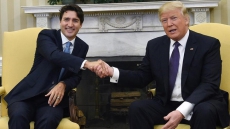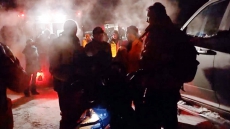OTTAWA — While most Canadians firmly back the Charter of Rights and Freedoms and strongly support the idea of diversity, a new poll suggests a third of Canadians would ban their elected officials from wearing religious symbols.
A majority of Quebecers canvassed in the survey agreed that federal, provincial and local politicians shouldn't be allowed to wear hijabs, crucifixes or turbans on the job.
Nationally, 49 per cent of respondents said they would not favour such a ban, but 37 per cent said they would support it.
The proposed ban would not extend to elected officials, but a question about whether it should was included among questions about how Canadians in different provinces feel about religions and religious signs.
The Leger Marketing poll was done to gauge public sentiment in light of a proposed secularism law in Quebec that would ban public servants in positions of authority from wearing religious symbols.
The survey of respondents, drawn from an online panel, canvassed the opinions of 2,215 adults across Canada between May 3 and 7. Because online panels aren't fully random samples of the population, no margin of error for the results can be calculated.
Jack Jedwab, president of the Association for Canadian Studies, which commissioned the survey, says a deeper dive into the numbers shows the strongest supporters of such a ban for politicians are those more likely to feel threatened by religious minorities. They also expressed negative feelings toward Islam, Muslims and react negatively to hijabs.
Respondents who said they interact more with and are comfortable around religious minorities are less likely to support banning religious symbols for elected officials, the data suggests.
Meanwhile, more than 80 per cent of all of those surveyed said they have positive views of the Charter of Rights and Freedoms and also said they favour multiculturalism.
The results indicate what Jedwab calls a "striking paradox" among Canadians.
"(People) express broad appreciation of diversity and say that our society is tolerant and accepting of religious-minority customs and traditions, yet at the same time ... we, to a significant degree, don't like the idea of politicians wearing religious symbols or signs."
The results of this survey suggest federal leaders will have to approach issues of religious symbolism carefully in seat-rich Quebec as the province moves to enact its secularism law while federal parties gear up for a fall federal election.
NDP Leader Jagmeet Singh, a practising Sikh who sports a brightly coloured turban, will have an especially challenging time in Quebec, Jedwab says.
"He's going to probably encounter some challenges that people probably will not express publicly, but that they feel privately," he said.
"Those feelings are out there ... Is it going to affect his chances of getting elected? It's difficult to say. It creates a new layer that is out there."
During the last federal election campaign, religious symbolism became a flashpoint after the Federal Court of Canada upheld a lower court's decision to strike down the former Conservative government's ban on wearing niqabs at citizenship ceremonies.
Former NDP leader Tom Mulcair took a firm stance against the ban — a move he later said he believes cost him the election, as support for the ban was strong in Quebec, where his party base was strongest.
Jedwab says he believes Prime Minister Justin Trudeau successfully skirted backlash on the niqab issue in 2015 because Mulcair took the brunt of Quebecers' concerns.
This time, Trudeau — who has spoken against the secularism bill and who has taken a strong stance in favour of welcoming immigrants and minorities — could have a more turbulent ride.
"It's going to be challenging for him because he needs to build and/or strengthen his base in Quebec. The challenge will be that there is a lot of support for these types of restrictions," Jedwab said.
Conservative Leader Andrew Scheer will also have to walk a fine line on issues of religious symbolism and immigration, Jedwab added.
"The polling numbers in this poll nationally suggest (Scheer) may be able to find a line through this thing where he says, 'We understand people's fears and insecurities, but we need to respect the Charter of Rights.' I don't think Mr. Trudeau will be saying he understands people's fears and insecurities, because that will validate them," Jedwab said.

